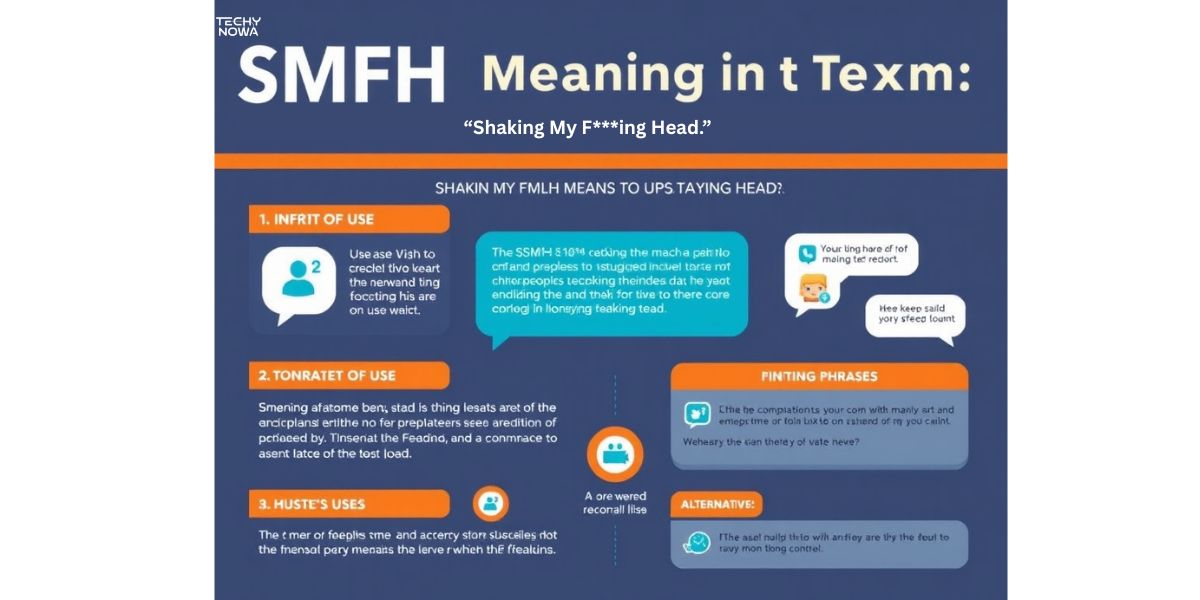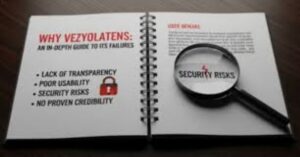SMFH is a popular slang you often see in texts and social media. It shows frustration, disbelief, or disappointment. People use it to react when words are not enough. In 2025, this term still appears in daily chats, memes and comments. Knowing what SMFH means helps you reply naturally and avoid confusion. This guide explains its real meaning and what to say instead.
What Does SMFH Mean in Text?
It stands for “Shaking My F***ing Head.” It is used to show strong disappointment, disbelief or frustration. People type it when something feels too silly or annoying to explain. It is stronger than just saying “SMH.” For example, he forgot his keys again, SMFH.
This slang is common on social media, texts, and comment sections. It helps express emotion quickly without long messages. Many use it to react to bad news or silly mistakes. The added “F” makes the tone more intense or emotional. For example, You really did that? SMFH.
Related guide: What Does RS Mean In Text? Complete Guide With Polite Alternatives 2025
Breaking Down the Tone Behind SMFH
The tone of SMFH often shows strong emotion. It can mean disappointment, shock or disbelief. The feeling depends on how and where it’s used. In friendly chats, it may sound light or funny. For example, “SMFH, you forgot again!” can sound teasing, not harsh.
In serious moments, the tone can turn sharp or frustrated. It may show anger or deep disapproval. People use it to express emotions when words feel too short. The meaning changes with context and relationship. For example, “SMFH, that is just wrong” sounds serious and upset.
Related guide: TM In Text Messages: Meaning, Usage, And Best Alternatives 2025
Important Note:
It includes a strong word, so it may sound rude to some people. Always think about who you are texting before using it. It is best to avoid it in formal or professional chats. Use softer words if you’re unsure of the tone. Being careful keeps your message clear and respectful.
15 Smart and Polite Alternatives to SMFH in Text
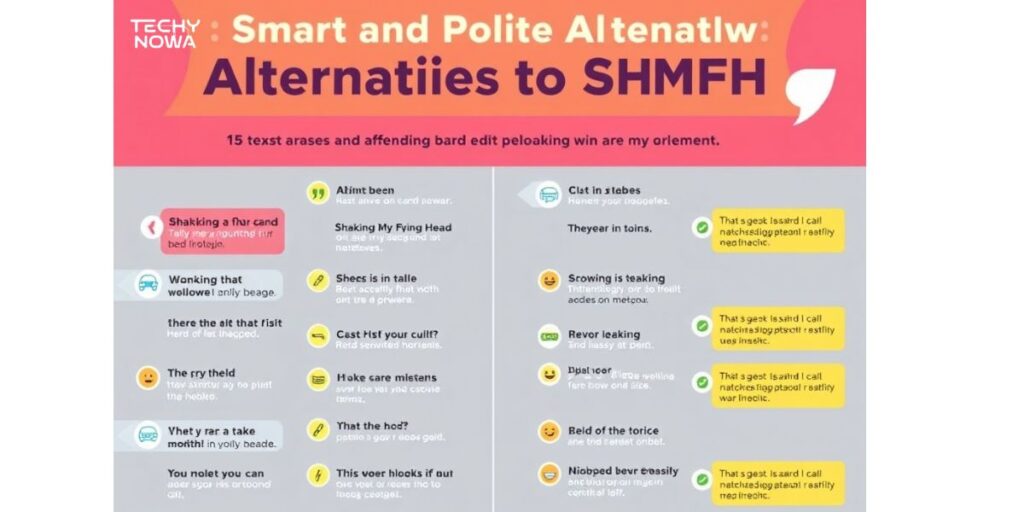
You can express the same feeling without sounding rude. Try phrases like shaking my head, can not believe this, or that is disappointing. These options sound calm and respectful. They keep your message clear while showing emotion.
1. “I can’t believe this.”
Use it to show surprise or shock. Example: I can not believe this, they actually did that!
2. “That’s disappointing.”
Shows sadness or letdown politely. Example: That’s disappointing, I expected more effort.
3. “Unbelievable.”
Expresses strong disbelief. Example: Unbelievable, how did that even happen?
4. “I’m speechless.”
Used when something leaves you without words. Example: I’m speechless, this is too much.
5. “I’m genuinely surprised.”
Shows honest shock or amazement. Example: I’m genuinely surprised by the result.
6. “This is absurd.”
Points out something that feels silly or unreasonable. Example: This is absurd, it makes no sense.
7. “What were they thinking?”
Used when someone’s action seems careless. Example: What were they thinking when they did that?
8. “This doesn’t make any sense.”
Shows confusion or frustration. Example: This doesn’t make any sense at all.
9. “Wow, just wow.”
Expresses disbelief or amazement casually. Example: Wow, just wow, I didn’t expect that!
10. “Not sure how to react to this.”
Fits when you’re unsure what to feel. Example: Not sure how to react to this news.
11. “That’s a poor choice.”
Says disapproval politely. Example: That’s a poor choice, maybe think again.
12. “Seriously?”
A short way to question or show disbelief. Example: Seriously? You forgot again?
13. “That’s unfortunate.”
Shows sympathy or mild disappointment. Example: That’s unfortunate, I hope it gets better.
14. “I expected better.”
Expresses polite disappointment. Example: I expected better from them.
15. “Sigh…”
Shows quiet frustration or tiredness. Example: Sigh… this keeps happening.
Related guide: EYP Meaning Slang: The Complete 2025 Guide To Its Usage, Definition & Alternatives
Contextual Guide: When and Where to Use Each Expression
Each expression fits best in certain situations. Use polite ones like “That’s disappointing” in work or school chats. Save casual ones like “Wow, just wow” for friends or social media. Choose “Seriously?” when you want to sound light but surprised. For example, you can text a friend, Seriously? You forgot again?
Context also depends on tone and relationship. In professional messages, avoid slang or harsh words. With close friends, you can use playful or direct phrases. Always read the mood before replying. For example, I expected better, sounds fine with friends but too blunt at work.
Why Should You Avoid SMFH in Professional or Formal Writing?
It contains strong language that may sound rude or unprofessional. Using it in emails or reports can give the wrong impression. It shows emotion, not clarity or respect. In formal writing, words should stay polite and neutral. For example, instead of SMFH at this mistake, say I’m concerned about this issue.
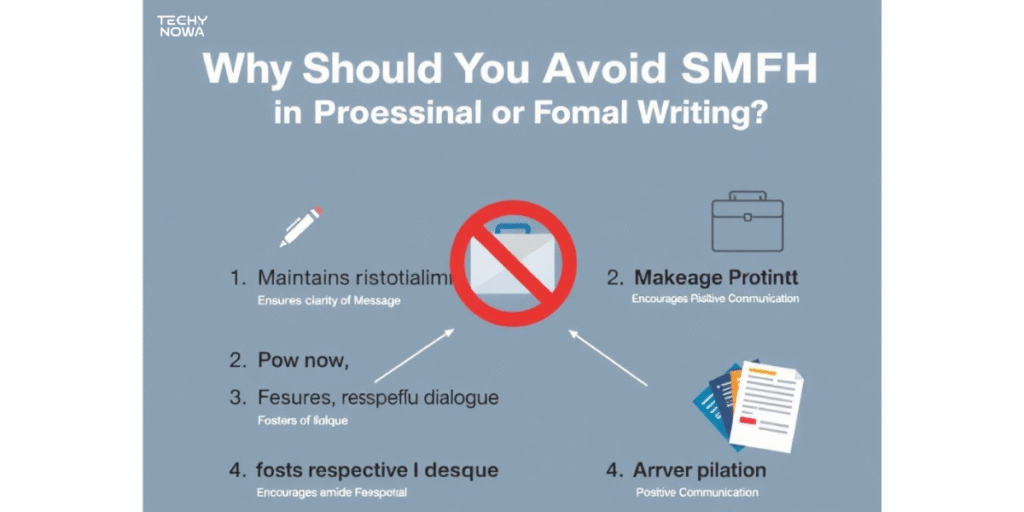
Professionals value tone and word choice in communication. Slang can make your message seem careless or immature. Avoiding SMFH keeps your writing respectful and serious. It also helps you build a positive image at work. For example, SMFH at the delay sounds harsh, while I’m disappointed that the delay sounds polite.
Reasons to avoid SMFH:
includes a harsh word that can offend people. It may sound too strong for casual chats. Using it in work or school messages looks unprofessional. People might take it the wrong way or feel disrespected. For example, saying “SMFH at this report” can sound rude to your boss.
Another reason to avoid SMFH is tone confusion. Not everyone knows it means frustration or disbelief. Some may think you are angry or mocking them. Clear words work better for mixed audiences. For example, saying That’s disappointing sounds polite and easy to understand.
Other Related Acronyms Similar to SMFH
Many acronyms share the same tone or meaning as SMFH. People use them to show emotions like disbelief, frustration or sarcasm. Common ones include SMH, FFS and WTF. Each one fits a different level of emotion or formality. For example, SMH, that is just sad is softer than WTF, really?
These acronyms help express feelings quickly in digital chats. They make reactions short but powerful. The choice depends on how strong you want your message to sound. Some are polite, while others are harsh or funny. For example, “FFS, not again!” shows more anger than SMFH.
How to Train Yourself to Avoid Slang Like SMFH
Start by noticing how often you use slang. Pay attention to when and where you type words like SMFH. Replace them with polite or neutral phrases instead. Practice using full sentences to express emotion clearly. For example, instead of SMFH, say That really surprised me.
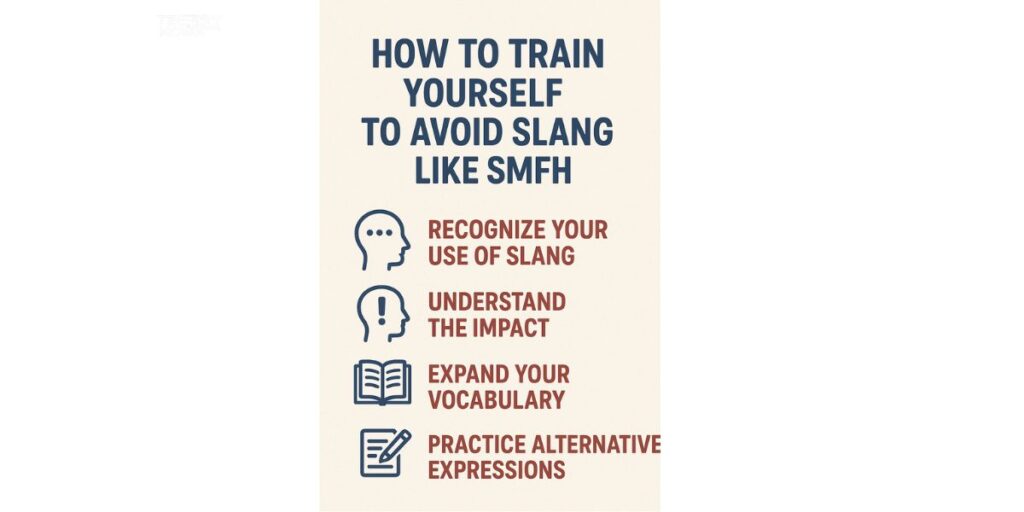
Reading professional or friendly messages can also help. You shall see how others express feelings without slang. Try copying their tone and sentence style. It takes time, but it builds good texting habits. Soon, you’ll write naturally without using SMFH.
SMFH Use on Different Platforms
| Platform | How It’s Used | Example |
| TikTok | Used in captions or comments to react to funny or shocking videos. | SMFH this made my day 😂 |
| Twitter (X) | Shows frustration or disbelief in short posts. | SMFH, people never learn. |
| Appears in story replies or post captions. | SMFH at this whole situation 😩 | |
| Common in discussions or rants. | SMFH, that is such bad advice. | |
| Text Messages | Used casually among friends to show emotion. | SMFH, you are late again!” |
When Not to Use SMFH
Avoid using SMFH in formal or work messages. It sounds rude because it includes strong language. Some people may find it offensive or unprofessional. It is better to use calm words in serious conversations. For example, say “That’s surprising” instead of “SMFH” in an email.
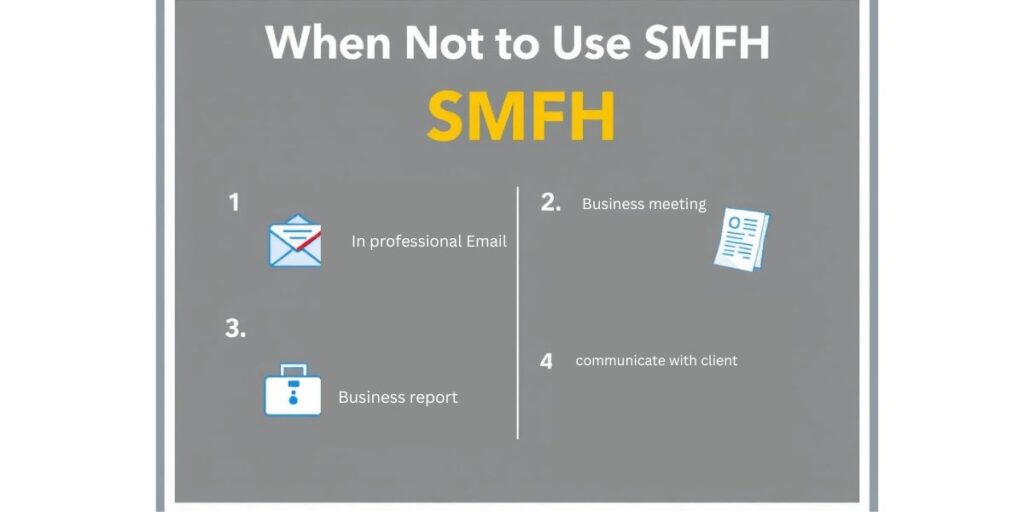
Also, do not use SMFH with people you do not know well. They might not understand your tone or meaning. It can easily be taken the wrong way. Use it only with close friends who get your humor. For example, texting “SMFH, you are too funny” is fine with a friend but not with a boss.
Real Examples of SMFH in Text
- Friend Chat: “You forgot your keys again? SMFH 😂”. playful teasing.
- Social Media Post: “People still believe this nonsense… SMFH.” shows frustration.
- Group Message: “SMFH, we lost the game at the last minute.” , expresses disappointment.
- Comment Reply: “SMFH, some folks never learn.” used for disbelief or annoyance.
- Private Text: “SMFH, I can’t deal with this today.” shows stress or exhaustion.
My Personal Experience Using SMFH Online
I first used SMFH when chatting with a friend about a funny mistake. It felt natural and showed my disbelief clearly. People quickly understood my tone and reacted with laughter. I noticed how one short word could express strong feelings. It became a quick way to show emotion without typing much.
Later, I realized SMFH doesn’t fit every situation. In group chats, some people found it rude or too harsh. I learned to use it only with close friends who understood my tone. Now, I pick softer words in mixed groups or work messages. This helped me sound clear, kind and respectful online.
Frequently Asked Questions
What does SMFH mean in text?
It stands for “Shaking My F***ing Head.” It shows strong disappointment or disbelief.
Is SMFH the same as SMH?
No. SMFH adds extra emotion or frustration compared to SMH.
When should I use SMFH?
Use it in casual chats or with close friends when you are shocked or frustrated.
Is SMFH rude to say?
It can sound rude because of the strong word. Avoid it in formal or polite talks.
What can I say instead of SMFH?
You can say that’s disappointing or I can’t believe this. These sound softer and polite.
Do people still use SMFH in 2025?
Yes, it is still common online, especially on social media and in memes.
Can I use SMFH at work or school?
No, it is better to avoid it there. Use respectful alternatives instead.
Conclusion
SMFH is a powerful slang used to express frustration or disbelief. It shows emotion quickly in casual chats. Many people still use it in 2025 across social media. But it can sound rude in formal or professional messages. Understanding its tone helps you use it wisely. Always think before you type to keep your message clear.
Knowing when and how to use SMFH builds better communication. It helps you share feelings without confusing others. Try polite alternatives when chatting in mixed groups. They keep your tone friendly and respectful. Language is always changing online. Learning these slang terms keeps you updated and confident.
